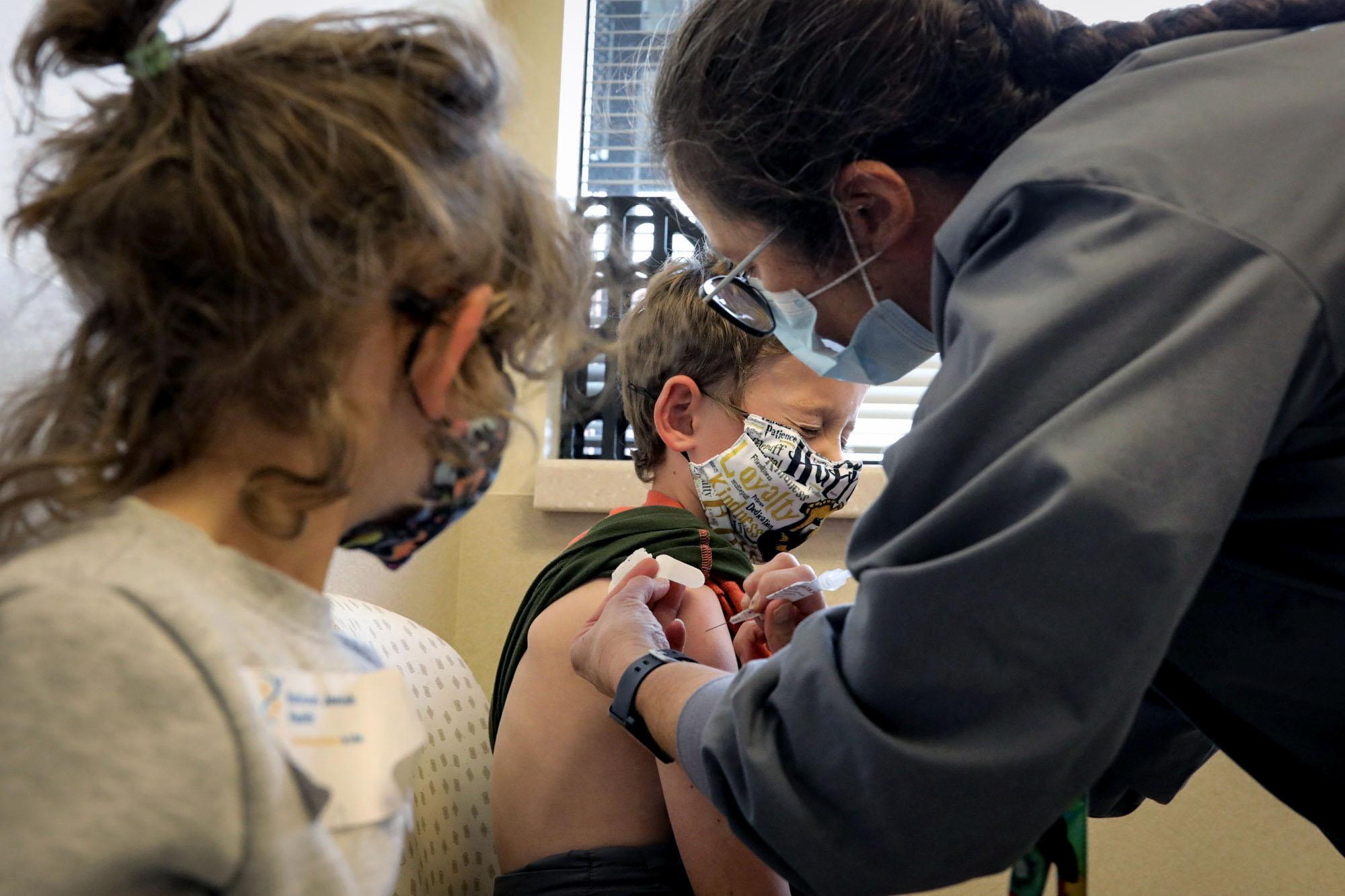
Colorado Gov. Jared Polis marked a grim pandemic milestone Friday.
9,000 of the state’s residents have now died in less than two years from the coronavirus.
While Colorado ranks 9th from the bottom in deaths per capita among the 50 states, he said, “that’s hardly a consolation to their friends and family.”
The comments come as Colorado grapples with a brutal fifth wave, which is poised to be the state’s worst of the pandemic and is putting its frontline providers, patients and hospitals under enormous pressure.
One out of every 38 unvaccinated Coloradans is infected with the virus, according to the governor's office. Overall, one out of every 62 Coloradans is infected.
The state’s hospitals recorded 1,518 COVID-19 patients Friday, a drop of 17, but still a number nearly as high as the state has seen in a year. And 82 percent of COVID-related hospitalizations are among the roughly 20 percent of Coloradans who are unvaccinated.
Polis continues to push vaccines as the way out of the pandemic
Asked, as he is at virtually every appearance in front of reporters, if the precarious hospital situation now calls for more dramatic statewide measures, like indoor restrictions or a mask mandate, Polis fell back on a familiar refrain: essentially, no.
The Democrat said that unlike early in the pandemic, when the state made such moves, now vaccines are available.
“Last December, we had very rudimentary tools,” Polis said, repeating his view that vaccines provide the path out of the pandemic.
He called it “frustrating” that roughly 20 percent of Coloradans haven’t yet gotten vaccinated.
“Sometimes it just seems like a mystery why they don't seem to love themselves enough to avail themselves of that level of protection,” he said. “One thing is clear, you can win people over with honey more than vinegar.”
He offered advice to those trying to convince friends and family to get vaccinated.
“I think it's important to not be in their face in a hostile way, but to simply say, ‘here's the data, here's the facts,’ emailing studies that have been done, articles that have been done, being able to gauge in a constructive discussion with folks about what their hesitation might be. It could be as simple as a fear of a needle.”
Local public health experts continue to ask for a statewide mask mandate
Increasingly, the governor has been under pressure to adopt a statewide mask mandate to limit the spread of the virus, with the state’s test positivity rate notably high, nearly 10 percent, as high as it’s been in about a year.
For example, Jefferson County’s board of public health sent Polis a letter on Thursday urging him to implement a temporary executive order requiring face coverings in all indoor public spaces for all individuals two years and older regardless of vaccination status.
“The continuing rapid proliferation of COVID-19 and delta variant cases within our state and county continues to be of grave concern,” said Greg Deranleau, president of the Jefferson County Board of Health.
Some public health experts agree with those local leaders. They say a statewide mask mandate could have two impacts: increasing compliance with masking, and alerting the public that the situation is urgent.
“The ‘sending the signal to the public’ thing is really important,” said Samuel Scarpino, a complex systems scientist and the Managing Director of Pathogen Surveillance at The Rockefeller Foundation.
Also, local health directors representing six Denver area counties want Polis to issue a statewide public health order requiring proof of vaccination from both patrons and staff for high-risk indoor places including bars and restaurants to curb the surge in COVID-19 hospitalizations, according to a letter obtained by Denverite dated Nov. 12.
But while some counties look to the state, Polis points back at local officials to take the lead.
“We strongly support local governments taking the steps they need to protect the members of their public,” he said Friday. “I think it's important to make sure that local decision-makers on the ground are making these calls.”
Colorado is trying to open up antibody treatment
Polis has also touted other options, like monoclonal antibody treatment. Starting Monday, Coloradans can get access to monoclonal antibody treatments for COVID-19 without a doctor's referral.
Any resident with a positive test can call the state at 1-800-268-2926 to see whether they are eligible for it and sign up for an appointment if one is available. Another option is to go online to the state’s website at covid19.colorado.gov/monoclonal.
Some Colorado doctors have told CPR News that the treatment is hard to find, though.
- Nov. 17: Colorado approaches new pandemic peak as COVID hospitalizations top 1,500 and only 75 ICU beds remain available
- Nov. 10: Colorado could exceed hospital capacity in December as Polis pushes boosters, but no mask mandate in sight
- Nov. 8: With Colorado hospitals full and short-staffed, some health care providers may need to work in roles they aren’t certified for
- Nov. 3: With Colorado hospitals overwhelmed, patients can now be transferred anywhere in the state
- Nov. 1: New Colorado health order allows hospitals to refuse patients as COVID cases and hospitalizations rise
- Oct. 25: Colorado COVID-19 hospitalizations keep rising, with unvaccinated patients filling ICUs and acute care wards
- Oct. 22: ‘No place for the patient to go ’ — As a new COVID wave hits, hospitals struggle to find open beds
- Oct. 12: Hospitalizations and deaths climb as Colorado’s fifth COVID wave keeps rising








